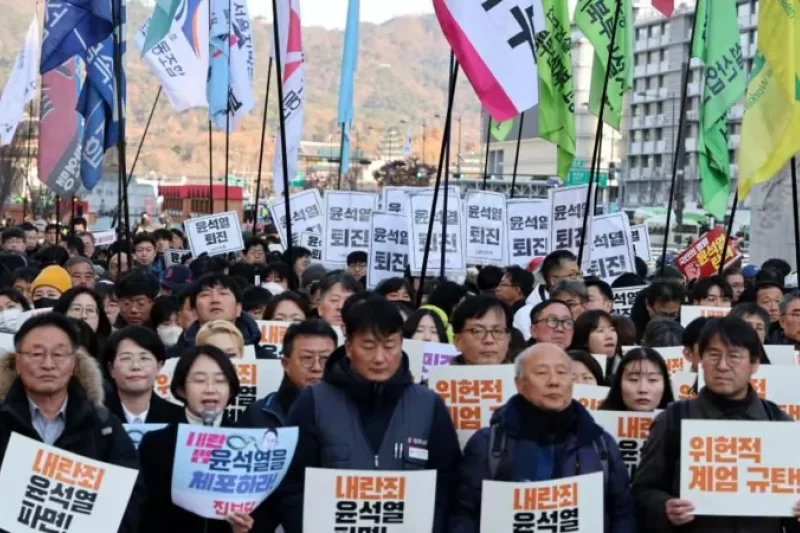South Korea Opposition Files Motion to Impeach President Yoon
South Korea's opposition lawmakers have begun impeachment proceedings against President Yoon Suk Yeol over his failed attempt to impose martial law.
The country woke up to an uncertain reality on Wednesday after a night of unprecedented scenes which saw Yoon unexpectedly impose martial law, 190 lawmakers gather to vote it down, and a sudden reversal of the decision around six hours later.
After introducing the impeachment motion, South Korea's main opposition Democratic Party condemned Yoon's initial martial law declaration as "insurrectionary behaviour".
Parliament will have to vote on whether to impeach Yoon by Saturday.
"We can no longer allow democracy to collapse. The lives and safety of the people must be protected," said Kim Yong-jin, a member of the Democratic party's central committee.
The Party also said it wants to charge Yoon with "crimes of rebellion".
It named Minister Kim Yong-hyun and Interior Minister Lee Sang-min as "key participants" of the martial law declaration, saying it also wanted them charged alongside Yoon.
But South Korea's ruling People Power Party, which Yoon is a member of, has agreed to oppose his impeachment, according to the country's Yonhap news agency.
The opposition needs at least eight of 108 ruling party lawmakers to back the bill in order for it to pass.
None of the ruling party lawmakers were present for the introduction of the motion at the National Assembly in the early hours of Thursday morning.
Schools, banks and government offices in Seoul were operating as usual on Wednesday, but protests continued throughout the city demanding the president resign.
"Arrest Yoon Suk Yeol," some angry citizens chanted as they filled the streets.
South Korea's largest labour group, the Korean Confederation of Trade Unions, vowed to go on indefinite strike until the president steps down.
On Wednesday, the country's defence minister Kim Yong-hyun tendered his resignation and said he would take full responsibility for the martial law. He apologised to the public for spreading confusion and causing distress, the ministry said in a statement.
Yoon's senior aides, including chief of staff Chung Jin-suk and national security adviser Shin Won-sik, also tendered their resignations.
Whether their resignations will be accepted by Yoon is unclear.
The reversal of the shock order early on Wednesday came after dramatic scenes overnight.
Hundreds of troops stormed the parliament after Yoon declared martial law, as military helicopters circled the site.
Some opposition lawmakers broke barricades and climb fences to get to the voting chamber. Woo Won-shik, the speaker of the National Assembly, told BBC Korea he rushed to parliament thinking "we must protect democracy" and scaled the fence.
Eventually, 190 lawmakers evaded police lines and forced themselves inside to vote down the order.
Thousands of protesters also arrived at the gates of the National Assembly. One woman was captured on video grabbing a soldier's gun.
"I was scared at first...but seeing such confrontation, I thought, 'I can't stay silent'," Democratic Party spokeswoman Ahn Gwi-ryeong told the BBC.
Yoon's second announcement - that he was reversing his earlier order - was met with cheers from protesters outside parliament.
Yoon, who won office by the slimmest margin in Korean history and whose approval ratings have hit a record low, said he declared martial law because he was worried about North Korean communist forces taking power in the country.
The presidential office has defended the initial decision as "strictly within [the country's] constitutional framework". It said on Wednesday that the announcement was timed to "minimise damage" to the economy and people's lives.
South Korea's allies had expressed alarm at the events, with US Deputy Secretary of State Kurt Campbell sharing "grave concern".
The US and Nato chief Mark Rutte welcomed the rescinded order on Wednesday. Rutte said it showed a commitment to the rule of law and affirmed the alliance's "iron-clad" relationship with South Korea.
(Source: BBC)













